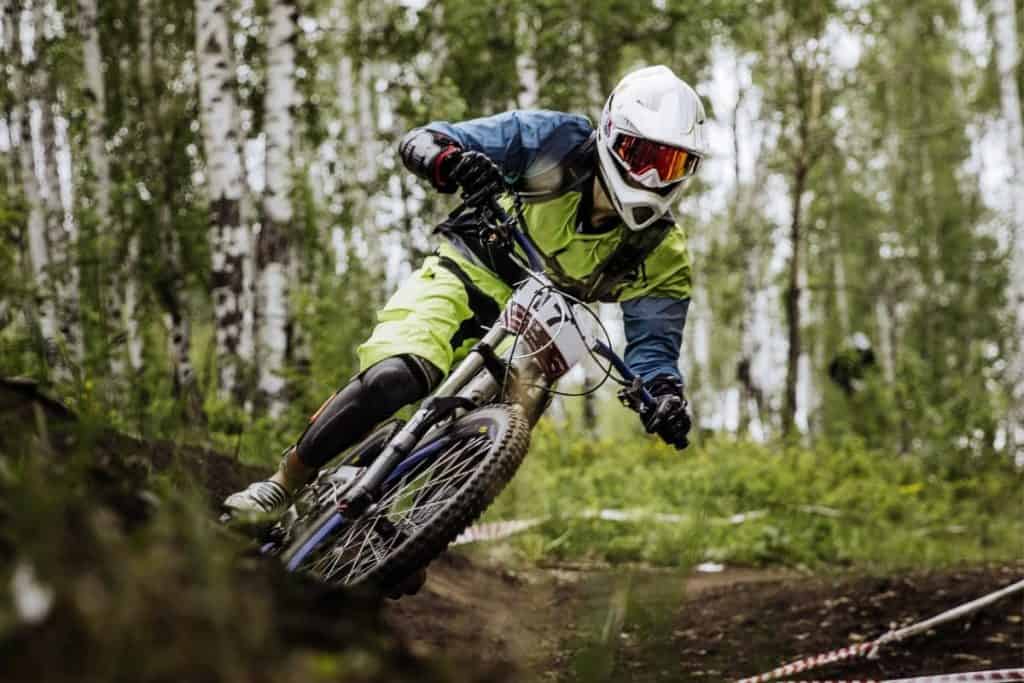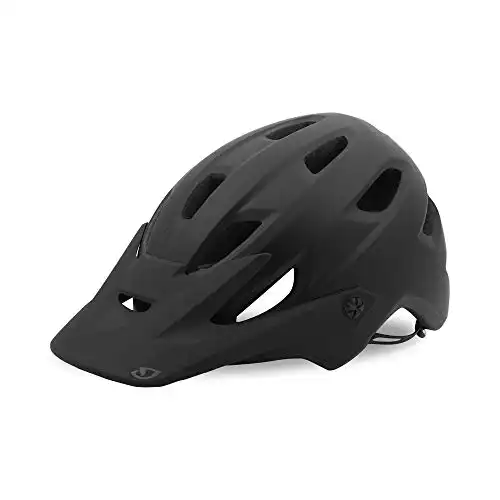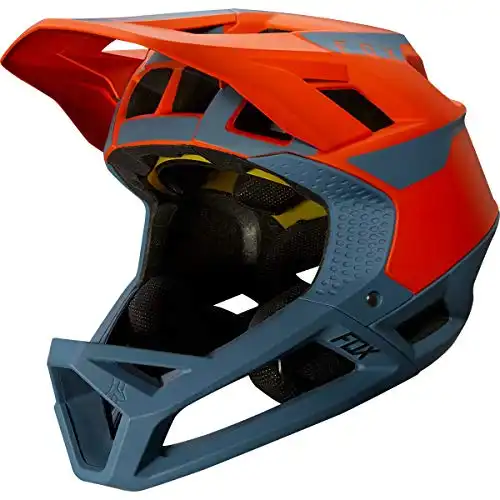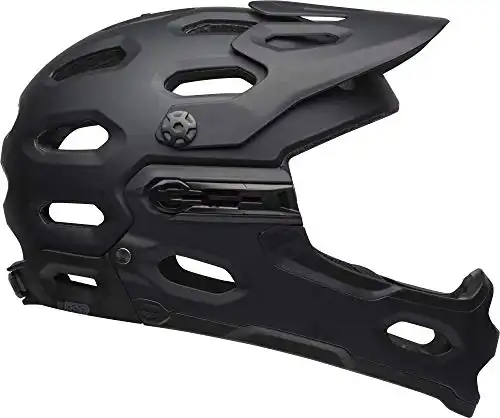
If you’re new to mountain biking, then one of the questions that you may find yourself wondering is whether or not you should get a full face helmet. We all know that minor (and sometimes major) crashes are part of the sport, so it’s understandable that you want to protect your face!
Full face helmets are generally unnecessary if you plan to be doing mostly cross-country mountain biking where the potential for a major crash is lower. However, if you plan on tackling more aggressive downhill sections or spending time in a bike park, then a full face helmet may be a wise choice.
With that in mind, it’s worth pointing out that the choice is still yours to make. There are pros and cons to both full and open face helmets, so let’s take a look at what might be the decision maker for you!
Why Do People Use Full Face Helmets While Mountain Biking?
The number one reason that some rider’s opt to wear a full face helmet over an open face one is safety! The larger helmet shell not only provides more protection around the back and sides of your head, but it also wraps around your chin as well.
This helps project your face and jaw from slamming into the ground, bike, etc… during a crash.
Whether you’re simply trying to protect your good looks or spare yourself the injury, this is a pretty worthwhile reason to wear a full face helmet!
The added protection can also help boost a rider’s confidence. For many, having the added security blanket protecting them allows them to get into the flow of riding and not be wrapped up in their head worried about a crash.
This benefit will vary from rider to rider, but if you’ve ever felt like a gladiator putting on pads to play a sport then you know the feeling!
Are Full Face Helmets Safer?

With all of the advancements to helmet technology over the last few years you may find yourself wondering if a full face helmet is really any safer. Given that most modern helmets employ MIPS technology, is it really any safer?
Even with these advancements, the short answer is still yes!
First, your head won’t make direct contact with the ground if you fall off of your mountain bike. Since the the full face helmet wraps around your face, it will help protect your face. This is because the helmet will hit the ground before your face does.
This not only spares your face from injuries, but the additional coverage over the rest of your head is also beneficial for preventing concussions and other head injuries.
Additionally, the extra coverage can also help to spare your face from bugs, dust, rocks, etc… that might be kicked up during riding and hit you. While this isn’t as big of a benefit, it’s certainly still worth calling out.
One counterpoint against full face helmets is that they reduce a rider’s visibility. Because of the extra material covering their face, it can lead to blind spots and gaps in visibility that would not be present with an open face helmet.
The good news is that this is something that most rider’s learn to overcome quickly. However, it does take some getting used to in the beginning.
When You Should Wear Full Face Helmets
While you could choose to wear a full face helmet on every single ride, that’s actually not the approach taken by most riders.
Because full face helmets are heavier and have limited air flow compared to open face helmets, they’re not often used by cross country riders. Cross country riders care about speed and efficiency, and the bulk of a full face helmet doesn’t help in this situation.
Also, consider that most cross country riding doesn’t involve extreme downhills or jumps, so the need for extra protection isn’t as strong. This isn’t to say that a full face helmet wouldn’t help in a crash, just that it’s less likely to be needed.
By comparison, those who spend most of their time on downhill courses or in bike parks are prime candidates for wearing a full face helmet. Due to the speed and airtime that these rider’s encounter, the likelihood of an injury during a crash are higher.
For these reasons, many downhill and bike park riders choose to wear full face helmets.
This isn’t to say that an open face helmet wouldn’t work for these types of riding, just that a full face helmet is probably the better choice. At the end of the day, wearing any helmet is always better than no helmet!
Pros for Open Face & Full Face Helmets
If you’re still not sure which option to choose, I’ve simplified things into a list of the benefits for full and open face helmets. If you can only buy one helmet, use this as a guide to making your decision.
Open Face Pros
- Lightweight
- Excellent ventilation
- Cheaper than full face helmets
- Good for warm/hot weather riding
- The standard in cross country riding
Full Face Pros
- Added face protection
- Better all-around head protection and shock absorption
- Warmer for cold weather riding
- The standard in downhill riding and bike parks
However, if you can afford to purchase two helmets, then that makes this an even easier choice as you can always get one of each and use it according to the situation!
Recommended Mountain Biking Helmets
No guide would be complete without actually recommending a helmet as well! While there are many great helmets on the market today, I find that particular ones offer a great value for the money and those are the ones that I like.
Keep in mind that a mountain bike helmet is not a “one and done” type of purchase. These helmets need to be replaced after serious crashes to ensure that they work properly again in the future.
After all, it’s your brain that we’re talking about protecting here!
-
 Check Current Price
Check Current PriceThe Chronicle MIPS provides the essential trail performance and protective capability you need in an affordable package that doesn't skimp on style!
-
 Buy from Amazon.com
Buy from Amazon.comThe Fox Proframe Helmet is the original full-face trail helmet and still the market leader. Designed to meet the needs of all-mountain riders and enduro racers, it packs MIPS technology and a dual-density EPS liner into a super light shell along with a fully integrated chinbar.
-
 Buy from Amazon.com
Buy from Amazon.comThe Super 3R gives you everything you need to own the trail. It's designed for the ever-changing needs of trail riding with a unique removable chin bar technology that basically gives you two helmets in one. You can remove and carry the chin bar in your pack during long climbs, and then lock it in place for that added boost of confidence on technical terrain.
While options 1 & 2 represent excellent choices for open and full face helmets, #3 is kind of an all-in-one option.
It has the ability to remove the chinbar when desired, while also having more protection than an open face helmet (chinbar or not). It won’t be as light or cool as a true open face helmet, but it’s not a bad choice if you can only buy one!
Can You Use a Road Helmet for Mountain Biking?
For those looking to save money, you may find yourself wondering if a road helmet can be used in mountain biking. After all, a road helmet doesn’t look that different from an open face mtb helmet!
While they may look similar on the surface, it’s worth pointing out some key differences between them.
- Road helmets are designed to maximize efficiency and airflow. Efficiency is the name of the game on the road!
- Mountain bike helmets are designed to maximize protection.
As you can see above, mountain bike helmets are focused on protection rather than efficiency because the likelihood of crashing is so much higher. For this reason, they use more material to increase protection around the base of the skull and top of the neck area.
So while you could use a road helmet for mountain biking, it would be a less than ideal choice.
A smaller consideration is that of the visor. Many road helmets have either a small or no visor at all. By comparison, mountain bike helmets have larger visors to keep the sun and branches out of your face. While not a huge point, it’s worth pointing out.
Any helmet is still better than no helmet, but you’ll be much better protected by purchasing a helmet made specifically for mountain biking. Yes, the gear overload is annoying, but it’s warranted when it comes to protecting your brain!
Making Your Choice
While there’s no reason that you can’t wear a full face helmet, it’s clear that their benefits are skewed towards certain types of riding situations. If you don’t mind the extra weight, price, or heat as a cross country rider, then by all means go for it!
However, if you don’t anticipate yourself being a downhill or bike park junky, then a full face helmet may be unnecessary.
At the end of the day, it’s most important that you go with whatever option makes you more comfortable riding. That way you’ll be able to spend more time on the trail, safely enjoying this fantastic sport!
